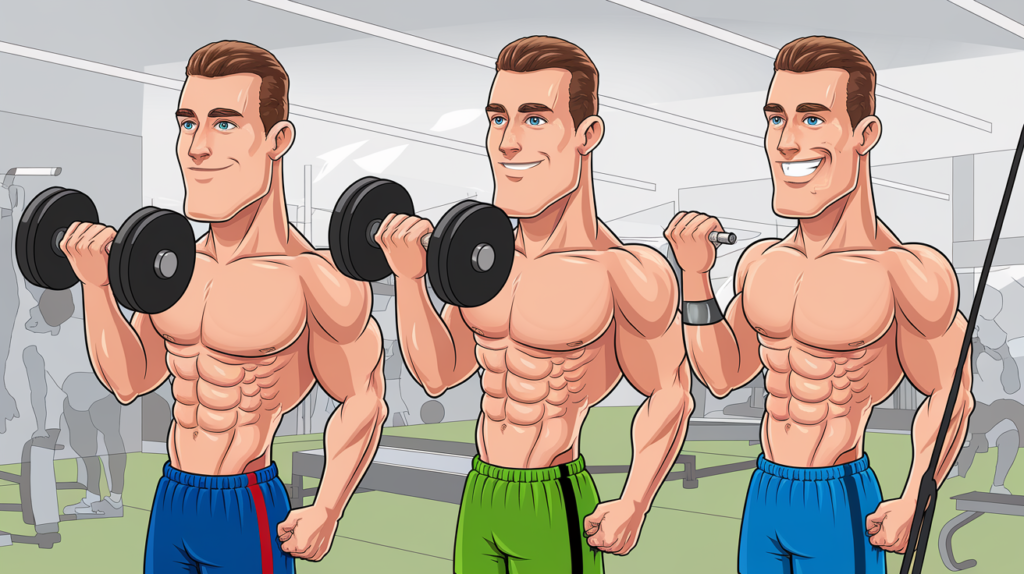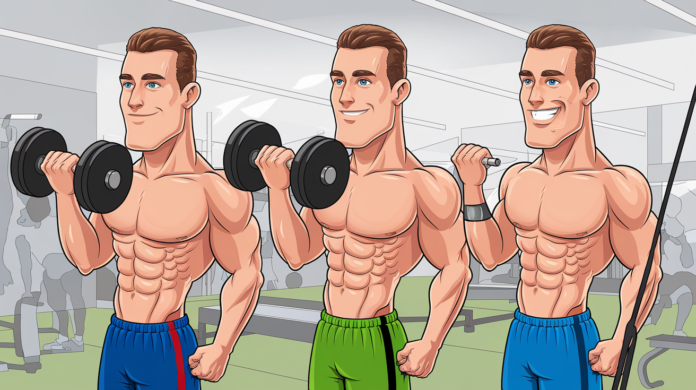Bicep curls are a fundamental exercise for building strong, defined arms. While the standard bicep curl is highly effective, there are numerous variations that can target different parts of the biceps and surrounding muscles, enhance muscle growth, and prevent workout monotony. Diversifying your arm training with different bicep curl techniques can help you achieve well-rounded muscle development and break through plateaus. In this guide, we’ll explore various ways to do bicep curls, how to perform each one correctly, and how to incorporate them into your workout routine for maximum gains.
Why You Should Diversify Your Bicep Training

Incorporating different bicep curl variations into your workout routine offers several key benefits:
- Targeting Different Muscle Fibers: Different curl variations emphasize different parts of the biceps and other supporting muscles, leading to more comprehensive muscle development.
- Preventing Plateaus: Regularly changing up your exercises helps prevent plateaus by continually challenging your muscles in new ways.
- Improving Functional Strength: Varying your bicep exercises can improve overall arm strength and functionality, making daily activities easier and reducing the risk of injury.
- Enhancing Muscle Symmetry: Different bicep curl variations can help address muscle imbalances, leading to more symmetrical and aesthetically pleasing arm development.
1. Standard Dumbbell Bicep Curl
How to Perform:
- Stand with your feet shoulder-width apart, holding a dumbbell in each hand with your arms fully extended and palms facing forward.
- Curl the weights upward by bending your elbows, keeping your upper arms stationary.
- Squeeze your biceps at the top, then slowly lower the dumbbells back to the starting position.
Benefits:
- Targets both heads of the biceps, promoting overall muscle growth and strength.
- Simple and effective, ideal for building foundational arm strength.
2. Hammer Curl
How to Perform:
- Hold a dumbbell in each hand with your palms facing your torso (neutral grip).
- Curl the weights upward while keeping your elbows close to your body.
- Pause at the top, then slowly lower the dumbbells back to the starting position.
Benefits:
- Focuses on the brachialis and brachioradialis, adding thickness to the upper arm.
- Enhances forearm strength and grip.
3. Zottman Curl
How to Perform:
- Hold a dumbbell in each hand with an underhand grip (palms facing up).
- Curl the weights upward, then rotate your wrists to an overhand grip (palms facing down) at the top.
- Lower the dumbbells back to the starting position with the overhand grip.
Benefits:
- Engages both the biceps and forearms, making it a comprehensive arm exercise.
- Improves wrist stability and grip strength.
4. Preacher Curl
How to Perform:
- Sit at a preacher bench and hold an EZ curl bar or dumbbell with an underhand grip.
- Rest your upper arms on the bench pad and curl the weight upward.
- Lower the weight slowly back to the starting position.
Benefits:
- Eliminates momentum, forcing the biceps to do all the work.
- Targets the lower portion of the biceps for fuller development.
5. Incline Dumbbell Curl
How to Perform:
- Sit on an incline bench set at about 45 degrees, holding a dumbbell in each hand with your arms hanging down by your sides.
- Curl the weights upward while keeping your upper arms stationary.
- Squeeze at the top, then slowly lower the dumbbells back to the starting position.
Read more Building a Strong lower back exercises bodybuilding: Essential Exercises for Strength and Mass
Benefits:
- Stretches the long head of the biceps, emphasizing the peak of the muscle.
- Increases the range of motion for better muscle activation.
6. Cable Curl
How to Perform:
- Attach a straight bar to a low pulley on a cable machine.
- Stand facing the machine and grab the bar with an underhand grip.
- Curl the bar upward while keeping your elbows close to your torso, then slowly lower it back to the starting position.
Benefits:
- Provides constant tension on the biceps throughout the entire range of motion.
- Joint-friendly and versatile, with the ability to adjust resistance easily.
7. Concentration Curl
How to Perform:
- Sit on a bench with your legs spread apart. Hold a dumbbell in one hand and rest your elbow on the inside of your thigh.
- Curl the weight upward toward your shoulder, isolating the biceps.
- Slowly lower the dumbbell back to the starting position and repeat with the other arm.
Benefits:
- Isolates the biceps for maximum contraction, improving muscle shape and definition.
- Ideal for targeting the biceps peak.
8. Reverse Curl
How to Perform:
- Hold a barbell or dumbbells with an overhand grip (palms facing down).
- Curl the weight upward while keeping your elbows close to your body.
- Lower the weight back to the starting position with control.
Benefits:
- Focuses on the brachialis and brachioradialis, helping to build overall arm thickness and forearm strength.
- Improves grip strength, benefiting other lifts.
Read more Revitalize Your Fitness Routine: Energize with Lower Back Exercises
9. Spider Curl
How to Perform:
- Lie face down on an incline bench with your chest supported and arms hanging down.
- Hold a barbell or dumbbells with an underhand grip and curl the weights upward.
- Squeeze at the top, then lower the weights back to the starting position.
Benefits:
- Isolates the biceps and eliminates cheating by removing any potential for momentum.
- Emphasizes the peak contraction, leading to better muscle definition.
10. 21s Curl
How to Perform:
- Hold a barbell or dumbbells with an underhand grip.
- Perform 7 reps of the lower half of a bicep curl, then 7 reps of the upper half, and finish with 7 full-range reps.
Benefits:
- Provides an intense pump by working the biceps through different ranges of motion.
- Enhances muscle endurance and growth through high-rep, high-volume training.
How to Incorporate Different Bicep Curl Variations into Your Routine
To get the most out of your bicep workouts, consider the following tips for incorporating these variations:
- Mix and Match: Choose 2-3 different bicep curl variations for each workout. For example, you might start with standard dumbbell curls, followed by preacher curls and hammer curls for a well-rounded session.
- Focus on Weak Points: If you struggle with certain aspects of your bicep development (e.g., peak, lower portion), prioritize exercises that target those areas.
- Vary the Volume and Intensity: Alternate between heavier weights with lower reps (4-6) and lighter weights with higher reps (12-15) to stimulate different muscle fibers and promote growth.
- Include Rest Days: Allow your biceps time to recover between workouts to prevent overtraining and support muscle growth.
Final Thoughts: Diversifying Your Arm Training for Maximum Gains
Incorporating different bicep curl variations into your routine is essential for achieving balanced muscle development, preventing plateaus, and enhancing overall arm strength. By targeting the biceps from various angles and using different forms of resistance, you can optimize your arm training and reach your fitness goals faster. Whether you’re aiming for size, strength, or definition, these bicep curl variations provide the tools you need to succeed.




